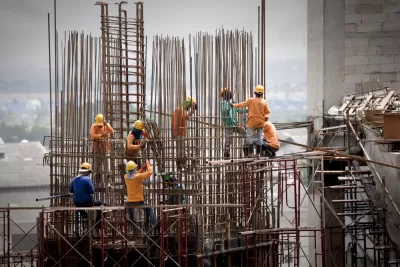An op-ed written by city officials from two South Bay Area cities argues that reform of land use regulations won't be enough to solve California's housing crisis.

Margaret Abe-Koga, Mountain View City Council member, and Rick Bonilla, deputy mayor of the city of San Mateo, write an op-ed for The Mercury News tackling the thorny issue of affordability in California's large coastal cities.
The duo's argument gives consideration to the construction industry, instead of the more typical punching bag of such polemics—land use regulations.
The driving forces behind our housing crisis are not just a shortage of supply, but also a persistent wage stagnation that has priced entire segments of our workforce out of the market. A policy solution must speak to both issues.
Enter the construction industry. Blue collar construction workers have seen a 25 percent decline in their inflation adjusted wages since 1990, according to data from a recent report by Smart Cities Prevail. Meanwhile, white collar employees of the same companies are reaping the benefits of soaring housing costs. "Developer fees and builder earnings now constitute a greater share (18 percent) of total project costs than construction wages and benefits (15 percent). Profits have grown 50 percent faster than either materials or labor," according to the article's recounting of the findings of the report.
Abe-Koga and Bonilla cite the report's findings to make the case for state legislation that would require prevailing wages for construction crafts. Streamlining local regulations, as some state legislators are currently suggesting, wouldn't be enough to bridge the gap between low wages and the high cost of living in the state.
FULL STORY: Opinion: Should private developers be required to pay prevailing wage to build housing?

Maui's Vacation Rental Debate Turns Ugly
Verbal attacks, misinformation campaigns and fistfights plague a high-stakes debate to convert thousands of vacation rentals into long-term housing.

Planetizen Federal Action Tracker
A weekly monitor of how Trump’s orders and actions are impacting planners and planning in America.

In Urban Planning, AI Prompting Could be the New Design Thinking
Creativity has long been key to great urban design. What if we see AI as our new creative partner?

King County Supportive Housing Program Offers Hope for Unhoused Residents
The county is taking a ‘Housing First’ approach that prioritizes getting people into housing, then offering wraparound supportive services.

Researchers Use AI to Get Clearer Picture of US Housing
Analysts are using artificial intelligence to supercharge their research by allowing them to comb through data faster. Though these AI tools can be error prone, they save time and housing researchers are optimistic about the future.

Making Shared Micromobility More Inclusive
Cities and shared mobility system operators can do more to include people with disabilities in planning and operations, per a new report.
Urban Design for Planners 1: Software Tools
This six-course series explores essential urban design concepts using open source software and equips planners with the tools they need to participate fully in the urban design process.
Planning for Universal Design
Learn the tools for implementing Universal Design in planning regulations.
planning NEXT
Appalachian Highlands Housing Partners
Mpact (founded as Rail~Volution)
City of Camden Redevelopment Agency
City of Astoria
City of Portland
City of Laramie





























